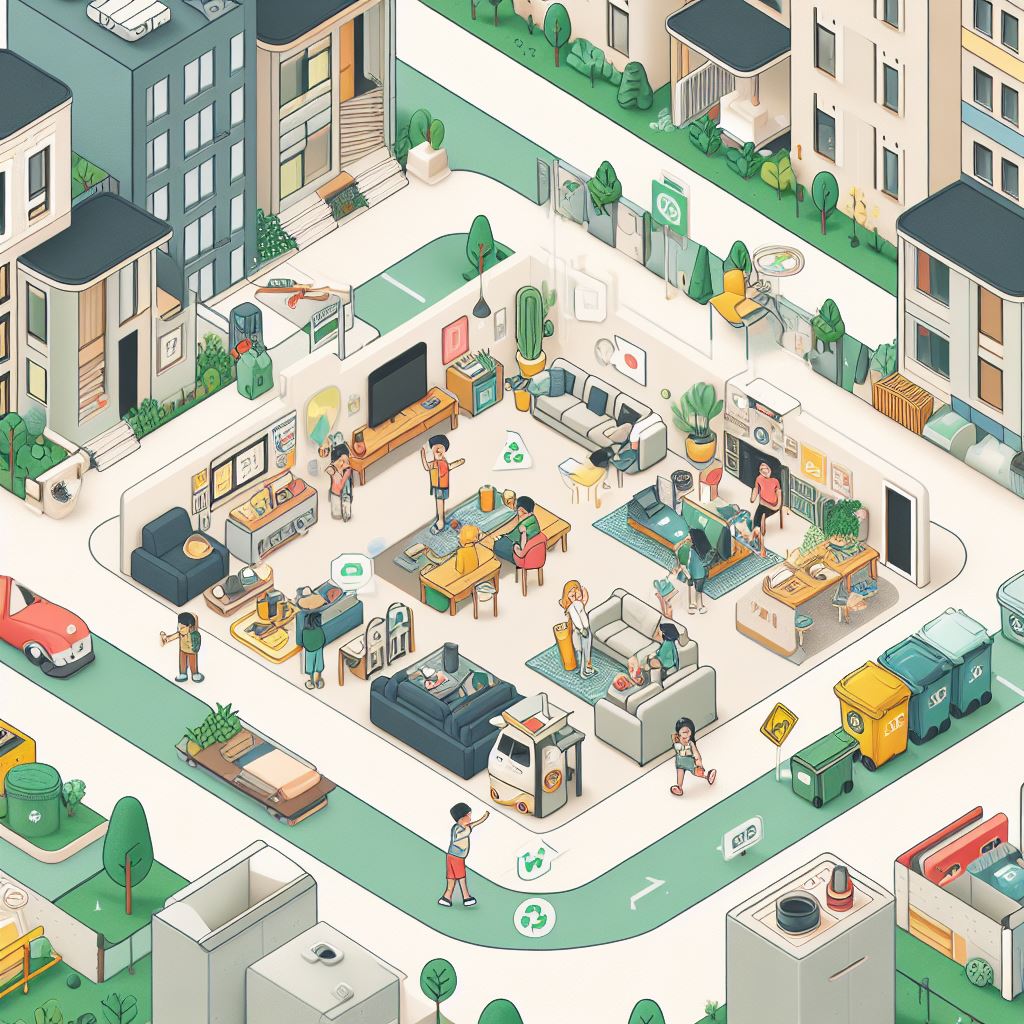How to Abide by Rules in Subsidized Housing

Did you know that over 4 million households in the United States live in subsidized housing? If you’re one of them, it’s important to understand and abide by the rules set by the Housing Authority.
This article will guide you through the key aspects of maintaining a clean living space, respecting noise regulations, handling maintenance and repairs, as well as engaging in community activities.
By following these guidelines, you can ensure a positive living experience in your subsidized housing.
Key Takeaways
- Familiarize yourself with the Housing Authority’s policies and regulations by reviewing the tenant handbook.
- Maintain a clean and tidy living space by regularly cleaning and disinfecting surfaces, keeping the kitchen clean, decluttering and organizing belongings, and regularly vacuuming and mopping.
- Respect noise and quiet hours by being aware of designated quiet hours, keeping noise to a minimum during those hours, being considerate of limited sound insulation, and minimizing noise through the use of rugs or closing doors and windows.
- Properly handle maintenance and repairs by promptly reporting issues, providing detailed information, following up if necessary, being cooperative and patient, and taking preventive measures to minimize frequent repairs.
- Engage in community activities and programs by joining resident committees or councils, attending events and programs organized by the housing provider, volunteering time and skills, learning new skills, and building a sense of belonging and community through active participation.
Understanding the Housing Authority’s Policies
To understand the Housing Authority’s policies in subsidized housing, you must carefully review the tenant handbook provided to you upon move-in. This handbook serves as a comprehensive guide that outlines your rights and responsibilities as a tenant, as well as the rules and regulations you’re expected to abide by. It covers various aspects of living in subsidized housing, including rent payment procedures, maintenance requests, and community guidelines. Familiarizing yourself with this handbook is essential to ensure that you comply with the Housing Authority’s policies.
The tenant handbook is designed to provide you with all the information you need to navigate your new living environment successfully. It includes details about the application process, income eligibility requirements, and the duration of your lease agreement. Additionally, it outlines the protocol for reporting any issues or concerns, such as repairs or neighbor disputes. By understanding and following these policies, you contribute to a harmonious and well-maintained living community.
In the subsequent section, we’ll discuss the importance of maintaining a clean and tidy living space. This isn’t only crucial for your personal well-being but also for the overall cleanliness and safety of the housing complex.
Maintaining a Clean and Tidy Living Space
Keep your living space clean and tidy to ensure a safe and comfortable environment for yourself and your neighbors. Maintaining a clean and organized living space not only promotes good hygiene but also contributes to a positive living experience.
Here are some tips to help you keep your subsidized housing unit clean and tidy:
- Regularly clean and disinfect surfaces: Use appropriate cleaning products to wipe down countertops, tables, and other frequently touched surfaces. This helps prevent the spread of germs and keeps your living space clean and healthy.
- Keep your kitchen clean: Wash dishes promptly, wipe down countertops, and clean appliances regularly. Proper food storage and disposal are also essential to prevent pest infestations.
- Declutter and organize: Keep your belongings tidy and free of clutter to create a more spacious and inviting living environment. Utilize storage solutions such as bins, shelves, and hooks to maximize space and keep things organized.
- Vacuum and mop regularly: Regularly vacuum carpets and sweep or mop hard floors to remove dust, dirt, and allergens. This helps maintain a clean and comfortable living space.
- Take out the trash regularly: Dispose of trash in designated areas and take it out regularly to prevent odors and pests.
Respecting Noise and Quiet Hours
Remember to respect the noise and quiet hours in your subsidized housing unit. It’s crucial to be mindful of the noise you generate and the impact it may have on your neighbors. Noise disturbances can lead to conflicts and disputes, which can disrupt the peaceful environment of your community. To ensure a harmonious living experience, follow these guidelines.
Firstly, be aware of the designated quiet hours in your housing complex. Typically, quiet hours are during the evening and overnight, when most residents are trying to sleep. During these hours, keep noise to a minimum by avoiding loud music, television, or conversations. If you must make noise, consider using headphones or relocating to an area where it won’t disturb others.
Secondly, be considerate of the soundproofing in your unit. Subsidized housing units are often built with limited sound insulation, meaning that noise can easily travel between walls and floors. Take extra precautions to minimize noise, such as using area rugs to reduce footsteps or closing doors and windows to prevent noise from escaping.
Lastly, communicate with your neighbors about any potential noise concerns. If you plan to have a gathering or anticipate making noise during non-quiet hours, inform your neighbors in advance and ask for their understanding. Showing respect and consideration for others’ needs can foster a sense of community and help maintain a peaceful living environment.
Properly Handling Maintenance and Repairs
Make sure you promptly report any necessary maintenance or repairs in your subsidized housing unit. Taking care of maintenance and repairs in a timely manner is essential to ensure the safety and comfort of your living space.
Here are some tips to properly handle maintenance and repairs in your subsidized housing:
- Report issues immediately: As soon as you notice any maintenance or repair needs, report them to the appropriate authority. This could be the property manager, maintenance staff, or a designated contact person.
- Provide detailed information: When reporting a maintenance or repair issue, be sure to provide detailed information about the problem. Include specific details such as the location, nature of the issue, and any relevant observations.
- Follow up if necessary: If the reported issue isn’t resolved within a reasonable timeframe, follow up with the responsible party. Keep records of your communication and document any further action taken.
- Be cooperative and patient: Understand that maintenance and repair work may take time to complete. Cooperate with the maintenance staff and be patient during the process.
- Take preventive measures: To minimize the need for frequent repairs, take proactive steps to maintain your living space. Regularly clean and inspect your unit, address minor issues promptly, and follow any guidelines provided by the housing authority.
Engaging in Community Activities and Programs
To fully embrace your experience in subsidized housing, actively participate in the various community activities and programs available to residents. Engaging in these activities not only helps you build a sense of belonging and community, but it also allows you to take advantage of the resources and opportunities provided by your housing provider.
One way to get involved is by joining resident committees or councils. These groups often meet regularly to discuss and address issues affecting the community. By being part of these discussions, you can contribute your ideas, voice your concerns, and help shape the policies and decisions that impact your living environment.
Another way to engage in community activities is by attending events and programs organized by your housing provider. They may offer workshops, educational sessions, or recreational activities for residents of all ages. These events provide opportunities to learn new skills, socialize with your neighbors, and strengthen community bonds.
Additionally, consider volunteering your time and skills to support community initiatives. Many subsidized housing developments rely on resident volunteers to organize and run activities such as after-school programs, community gardens, or holiday events. By contributing your time and expertise, you not only give back to your community but also forge meaningful connections with your neighbors.
Frequently Asked Questions
Can I Have Pets in Subsidized Housing?
Yes, you can have pets in subsidized housing. However, there may be restrictions and guidelines that you must follow. It’s important to familiarize yourself with the specific rules and regulations set by your housing provider.
Are There Restrictions on the Types of Decorations I Can Have in My Living Space?
“You should be aware of the restrictions on decorations in your living space. Some subsidized housing may have specific rules regarding the types of decorations allowed to maintain a cohesive and safe environment.”
How Often Are Inspections Conducted in Subsidized Housing?
Inspections in subsidized housing are conducted regularly to ensure compliance with rules. They help maintain a safe and healthy living environment. It is important to be aware of and follow the guidelines to avoid any issues.
Can I Sublet My Subsidized Housing Unit?
You cannot sublet your subsidized housing unit. It is important to follow the rules and regulations set by the housing authority to maintain eligibility and prevent any potential penalties or eviction.
Are There Any Limitations on the Number of Guests I Can Have in My Unit at One Time?
You are allowed to have guests in your subsidized housing unit, but there may be limitations on the number of guests you can have at one time. It is important to review the specific rules and guidelines set by your housing provider.



